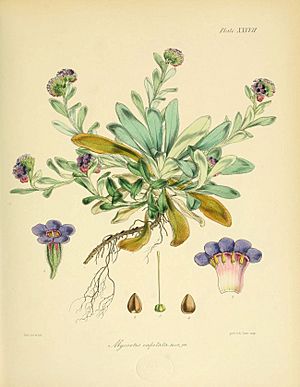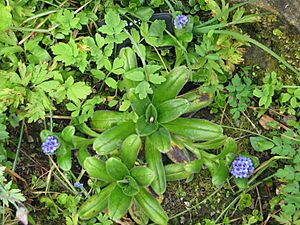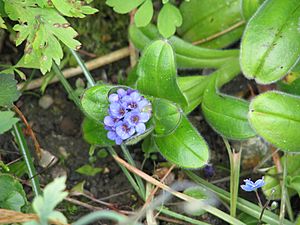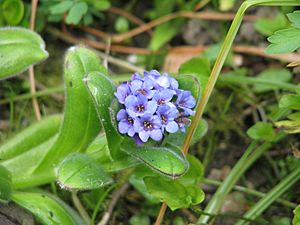Myosotis capitata facts for kids
Quick facts for kids Myosotis capitata |
|
|---|---|
 |
|
| Plate XXXVII of Hooker's Flora Antarctica | |
| Conservation status | |
|
Invalid status (NZ TCS)
|
|
| Scientific classification | |
| Genus: |
Myosotis
|
| Species: |
capitata
|
Myosotis capitata is a species of forget-me-not native to the Campbell and Auckland Islands. Joseph Dalton Hooker described the species in his 19th century work Flora Antarctica.
Description
Myosotis capitata forms small rosettes. The leaf-blades of the rosettes are 30-120 mm long by 10-25 mm wide and are rounded at the apex (and sometimes with a sharp pointed tip). The upper surface of the blades are densely covered in long silky hairs, while on the lower surface the hairs are shorter and fewer. Cymes are generally without bracts, are 8-flowered and the flowers are on very short stems. The calyx is 3-5 mm long and the corolla is a deep blue, with a cylindrical tube and the lobes are rounded and flat. The black nutlets are 1.2-2.5 by 1.2-1.5 mm.
It flowers from November to February, and fruits from December to February.
Habitat
It is found from sea level up to altitudes of 600 m, on cliff faces and in boulder fields.
Conservation Status
The species is listed as "At Risk - Naturally Uncommon" on the most recent assessment (2018) under the New Zealand Threatened Classification system for plants, because of its restricted range.
Etymology
Its specific epithet, capitata, derives from the Latin, caput/capitis, meaning "head" and hence describes the plant has having its flowers arranged in head-like inflorescences or having some other head-shaped structure.
Gallery




